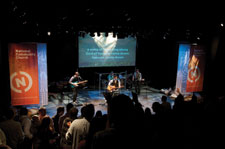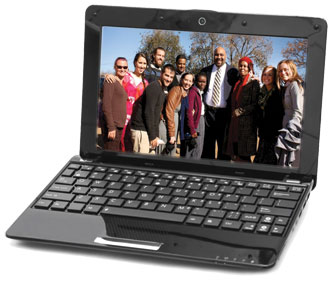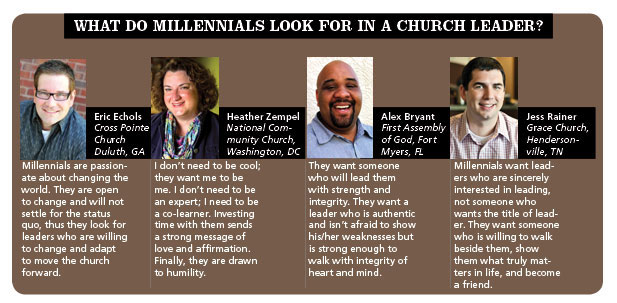
By Rez Gopez-Sindac
They want to change the world and will need intentional mentors to succeed.
 The millennials – those born after 1980 – constitute the new mega generation. Right now there are about 80 million millennials in America. This confident, connected and ethnically diverse generation is a major force to be reckoned with. They will be the dominant adult population for the first half of the 21st century and will be moving into positions of power and influence, according to Thom
The millennials – those born after 1980 – constitute the new mega generation. Right now there are about 80 million millennials in America. This confident, connected and ethnically diverse generation is a major force to be reckoned with. They will be the dominant adult population for the first half of the 21st century and will be moving into positions of power and influence, according to Thom
S. Rainer and Jess W. Rainer, authors of The Millennials: Connecting to America’s Largest Generation.
Yet the millennials desperately need guidance if they are to make a difference in the world. A lack of patience and loyalty, in addition to a strong feeling of entitlement, are some of the perceived weaknesses of this young generation.
But a more serious concern for many church leaders today is the millennial generation’s indifference to organized religion. According to the 2012 Millennial Values Survey – conducted jointly by Public Religion Research Institute and Georgetown University’s Berkley Center for Religion, Peace, and World Affairs – college-age millennials are more likely than the general population to be religiously unaffiliated. Another survey measuring religion among the millennials (produced by the Pew Research Center’s Forum on Religion & Public Life), reveals that 25 percent of adults under age 30 are unaffiliated, describing their religion as “atheist,” “agnostic” or “nothing in particular.”
So what will it take for churches to reach the millennials and lead them to become faithful followers of Christ – equipped and empowered to make an eternal impact on the lives of others?
 Reaching the millennials is not a complicated process, says 27-year-old author Jess W. Rainer, who also is the administration and outreach pastor at Grace Church in Hendersonville, TN. He says millennials like him already have so much that complicates life; that’s why they are looking for simplicity. The simplest and most creative way to reach the millennials, Rainer asserts, is to “get to know them, invite them to church, and share the Gospel with them.”
Reaching the millennials is not a complicated process, says 27-year-old author Jess W. Rainer, who also is the administration and outreach pastor at Grace Church in Hendersonville, TN. He says millennials like him already have so much that complicates life; that’s why they are looking for simplicity. The simplest and most creative way to reach the millennials, Rainer asserts, is to “get to know them, invite them to church, and share the Gospel with them.”
High tech, high touch
For Cross Pointe Church in Duluth, GA, one creative strategy is to take advantage of the millennials’ strengths, which is they are technologically wired and relationally connected.
“Our ministry strategy must be both high tech and high touch,” says Eric Echols, pastor of ministries at Cross Pointe Church.
“Technology is a way of life for millennials. They don’t just appreciate the use of technology in our ministries – they expect it. They also want relationships and personal connection.”
The same holds true for National Community Church in Washington, D.C., where about 60 percent of attendees are single and under the age of 35. “We meet in movie theaters around the D.C. area, and we utilize the movie theater screen much like modern-day stained glass to tell the story of God in moving pictures,” says Heather Zempel, discipleship pastor. NCC also communicates through Facebook and Twitter and podcasts its messages “so millennials can check us out online before they visit us in person.”
As a discipleship pastor, Zempel says her job is to cultivate environments where growth can happen – “not to dream up programs to disciple people, but to dream about how God wants to use each and every person at NCC to make disciples.” Zempel also serves on the teaching team and leads the church’s Protégé Program.
Character transformation
The Protégé Program is the brainchild of Steve Saccone, ministry development pastor at the Highway Community, Mountain View, CA, and author of Protégé: Developing Your Next Generation of Church Leaders. While serving on staff at Mosaic, a church in Los Angeles, Saccone grew passionate about investing in the development of the next generation of leaders that will lead the church into a better future.
 The Protégé Program, a two-year customized development process for protégés (people who seek to learn and grow) between 20 and 35 years of age, was launched at Mosaic in 2005. Since then churches from various denominations and faith traditions have adapted the program.
The Protégé Program, a two-year customized development process for protégés (people who seek to learn and grow) between 20 and 35 years of age, was launched at Mosaic in 2005. Since then churches from various denominations and faith traditions have adapted the program.
“We longed to create a place where protégés would experience the dynamics of true character transformation as the bedrock that would fuel their pursuit to become world-class, successful, morally and spiritually grounded kingdom leaders,” Saccone explains.
Mentoring is about making time to be with a young leader, says Saccone. “Young leaders crave opportunity for someone to take a risk on them, believe in them, and to have a person who opens doors for them and cheers them on in their growth journey as a leader.”
Saccone says one of the most effective and unconventional approaches he has used in mentoring the next generation of church leaders involves what he calls “novel peer-to-peer learning experiences.”
For instance, Saccone has organized group tours through the Church of Scientology so young leaders can feel what it’s like to be on “the other side of conversion.” A debriefing among participants follows the tour to help them gain insight into how they ought to share the Gospel message. Another example is listening to other communicators outside the church and analyzing their communication styles. Saccone says powerful learning happens when peers share with other peers what they are learning and how they are processing and analyzing everything.
Critical challenges
The millennial generation has a lot to offer. Millennials are optimistic about the future and see themselves as change makers. But it can be easy to see that they’re not perfect.
Alex Bryant, college and young adults pastor at First Assembly of God, Fort Myers, FL, admits the biggest issue for him is that millennials think they know pretty much everything. “I encounter a generation that is extremely smart and knowledgeable in so many areas,” says Bryant. “The challenge is to get them to remain teachable.”
At National Community Church, many of the young adults work jobs that are in some way influencing or influenced by the political world. Zempel describes them as “a bit of a paradox.” She admits they are self-centered and consumeristic, but also eager to contribute to something bigger than themselves. They are wary, untrusting and even a bit cynical of authority, but crave to be mentored.
Zempel says it’s hard to get the millennials to commit to faithful attendance of a once-a-week Bible study, but if you ask them to give two years of their lives to work with the poor in Sudan, they jump in without looking back.
Engaging millennials
That’s why to keep the millennials engaged and involved in church and God’s work, they have to be recruited to a cause, not just a volunteer role in the church, argues Eric Echols, pastor of ministries at Cross Pointe Church. If they know they are making a difference and changing a small part of the world, Echols says the millennial generation is more likely to be engaged in God’s work.
The vision has to be big, says Bryant. “When the vision is too small, complaining and self-focus happen.”
For Zempel it’s not about recruiting millennials to come to God’s work at the church; it’s about helping them discover how to be the church wherever God has positioned them.
Zempel says community and responsibility are key to making the millennials stay connected. “If they feel like they have a community that cares about them and encourages them, they stick. If they feel like they have ownership of some project and will be missed if they aren’t there, they stick.”
Dream church
So what kind of church do millennials want? Here’s a short list:
- They are looking for churches that have a strong vision.
- They are looking for diversity in the church.
- They are looking for a church that is built around community.
- They want a church that is outwardly focused.
- They are not plugging into churches that make them wait until they are older to have leadership roles.
- They align more with community than denomination; with active vision than mission statements.
More importantly, they need a place where the word of God is preached without apology, says Bryant. “This church is bigger than any denomination and stronger than the force that stands against it.”



